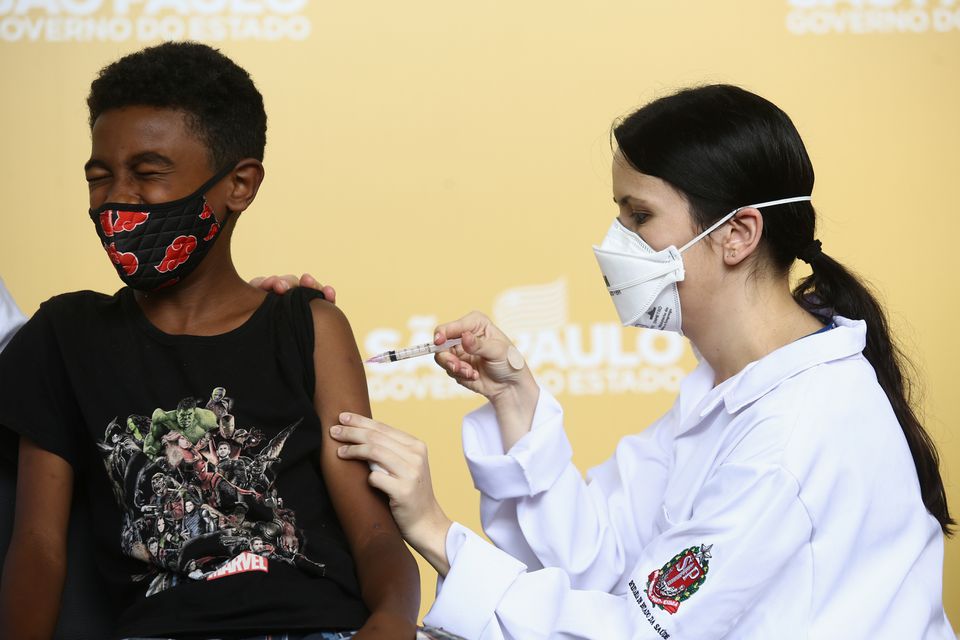
The following is a summary of some recent studies on COVID-19. These include research that requires further study to validate findings and has not yet been substantiated by peer review. Antibodies in children after COVID last 6 months or more
 |
| Luan Ribeiro Ferreira dos Santos receives a dose of Sinovac Biotech's Coronavac vaccine against the coronavirus disease (COVID-19), as the National Health Surveillance Agency (ANVISA) approved its use for children, in Sao Paulo, Brazil, January 20, 2022. |
The following is a summary of some recent studies on COVID-19. These include research that requires further study to validate findings and has not yet been substantiated by peer review. Antibodies in children after COVID last 6 months or more
Most children and adolescents with COVID-19 antibodies after SARS-CoV-2 infection usually still have antibodies in their blood after half a year, new data show. Beginning in October 2020, researchers in Texas recruited 218 subjects between the ages of 5 and 19. Each provided three blood samples, between three months. More than 90% were not vaccinated when they enrolled in the study. The first blood test showed infection-associated antibodies indicating recovery from COVID-19 in one-third of children, researchers reported online Friday in Pediatrics https://publications.aap.org/ pediatrics/article/doi/10.1542/peds. 2021-055505/185412/Durability-of-SARS-CoV-2-Antibodies-From-Natural. Six months later, 96% of those with antibodies still have it. The study was designed to detect the presence of antibodies, which are only a fraction of the immune system’s defenses, not the quantity of antibodies. The level of protection even in those with antibodies is unclear. The researchers found no difference based on whether a child had no symptoms, severity of symptoms, when they had the virus or because of weight or gender.
“It’s the same for everyone,” Sarah Messiah of UTHealth School of Public Health Dallas said, in a statement. “Some parents … just think because their child had COVID-19, they are now protected and don’t need to be vaccinated,” Messiah said. “We have a great tool available to give kids extra protection by getting their vaccine.” A small study published earlier this month on the JAMA Network Open https://jamanetwork.com/journals/jamanetworkopen/fullarticle/2789845 suggested that most children infected with the coronavirus do not have antibodies in their blood afterwards. Only 37% of children appeared to develop antibodies, compared with 76% of adults, even though the viral loads were identical in the two groups, those researchers found.
Experimental vaccine in SK shows promise against Omicron A booster shot of an experimental vaccine developed by SK Bioscience Co. has shown “strong protection” against the Omicron variant in Rhesus macaques, according to new data.
The monkeys received two initial doses of the vaccine and a booster after 6 or 12 months. Blood samples from bred primates showed “surprisingly high” levels of antibodies that could neutralize both the original virus strain and the Omicron variant that caused infections to rise, the researchers on Sunday at bioRxiv https://www.biorxiv.org/content/10.1101/2022.03.18.484950v1 prior to peer review. The animals ’second lines of immune defense are“ durable and persistent, ”they say. The vaccine, called GBP510, triggers responses from the immune system by delivering copies of an important component of the spike protein from the surface of the coronavirus. The “subunits” of the protein are glued to the nanoparticles to resemble the virus itself. These ingredients are supplemented with an adjuvant from GSK that boosts immune system responses, explains Bali Pulendran of Stanford University in California. “Vaccination with two doses … followed a year later by a booster shot … along with adjuvant, led to highly robust antibody responses and protection against infection with Omicron, at least six months later, ”Pulendran said. Large trials are being conducted in the final phase of GBP510 on humans.
AstraZeneca drug less protective compared to Omicron in transplant patients AstraZeneca antibody shots given to prevent COVID-19 in high-risk children and adults with weak immune systems do not adequately protect those will receive an organ transplant from the Omicron variant, the researchers discovered.
The drug, Evusheld, protects against the Delta variant in kidney transplant recipients, and lab test results released Monday show that Evusheld can neutralize Omicron in rats, including highly contagious version of BA.2. But of the 416 kidney recipients treated with Evusheld after Omicron became the primary variant, 9.4% developed symptoms of breakthrough infection, with one-in-three of the patients requiring hospitalization, the researchers reported. on Saturday at medRxiv https://www.medrxiv.org/ content/10.1101/2022.03.19.22272575v1 prior to peer review. Two patients died of COVID-19. In lab experiments, researchers exposed the BA.1 version of Omicron that caused a massive winter surge in blood samples from 15 patients treated with Evusheld. None of the samples could neutralize the virus. The U.S. Food and Drug Administration recently advised https://www.fda.gov/drugs/drug-safety-and-availability/fda-authorizes-revisions-evusheld-dosing that higher doses of Evusheld are likely to be needed to avoid Omicron infections, and patients who received originally approved shots should receive booster doses. The researchers said kidney transplant recipients “should be advised to maintain health protection measures and undergo vaccine boosters.”
(Source: Reuters)





